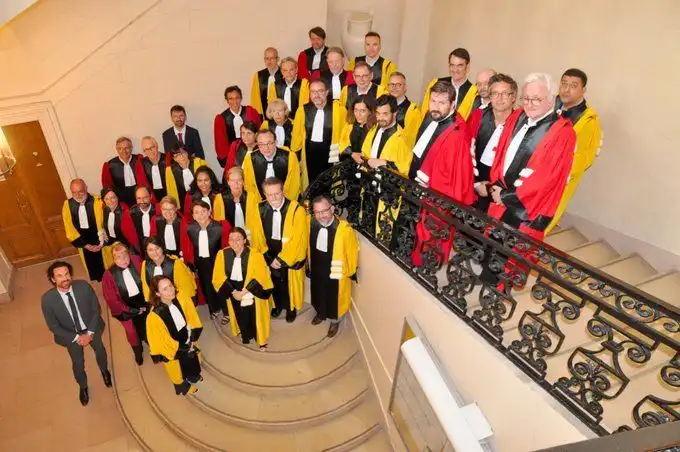Home>Memorial, the Russian human rights organisation, awarded Nobel Peace Prize for 2022
07.10.2022
Memorial, the Russian human rights organisation, awarded Nobel Peace Prize for 2022
On Friday, 7 October 2022, the Russian organisation Memorial was awarded the Nobel Peace Prize 2022. In June of that same year, its Executive Director, Elena Zhemkova, went in person to Sciences Po to receive the title of Doctor Honoris Causa, awarded by the President of the school, Mathias Vicherat. Take a look back at this ceremony organised as part of events to mark Sciences Po’s 150-year anniversary, and attended by many members of the permanent faculty.
“A national memory that faces up the past"
As the executive director of Memorial International, Zhemkova agreed to receive this distinction on behalf of her organisation as a whole. Founded by Nobel Peace Prize laureate Andreï Sakharov, Memorial International has spent 30 years working in Moscow and across Russia, as well as in several other European cities, to compile a history of mass atrocities and political repression in the former USSR and to defend human rights wherever they are threatened. The Russian authorities’ decision to dissolve the organisation, in an order issued in December 2021 and confirmed on 27 February 2022, three days after the start of the war in Ukraine, constitutes an unacceptable attack on historical memory, democratic values, academic freedom and freedom of expression.
In his introductory speech at the ceremony, president of Sciences Po Mathias Vicherat praised the “fundamental role that Memorial has played in defending history as a science and not as a tool to be weaponised in propaganda, to spread a national narrative or a political interpretation; instating a national memory that faces up to the past honestly and unselectively”. Highlighting the commitment of a number of Sciences Po’s professors and researchers to studying authoritarian regimes, totalitarian states, persecution and mass atrocities, and to memorialising historical tragedies, the president re-emphasised the long tradition of Russian and soviet studies at the institution. “There is clearly a commonality of thought, convictions and natural affinities between Memorial and Sciences Po.”
Addressing Elena Zhemkova directly in the next part of his speech, Mathias Vicherat commended Memorial’s work: “The organisation you represent embodies one of the most dignified and admirable forms that the fight against this unconscionable violence can take. Women, men, ideas, convictions, solidarity: these may seem like fragile things in the face of crime and barbarism, but they are weapons in which an organisation like yours and a university like ours believe deeply, and which we seek to elevate to the highest level.”
Sciences Po professor, Sabine Dullin, was the next to speak, giving the traditional laudatio in honour of the honorary doctor. “Memorial was born in 1987 out of the intellectual effervescence of the Perestroika discussion clubs and in an effort to uncover Russia’s Stalinist past (...) It was born with the aim of documenting, analysing and communicating the history and memory of crimes perpetrated by the Soviet regime, particularly those perpetrated under Stalin”, recalled Dullin, a specialist in Russian history, head of Sciences Po's Department of History.
She continued: “the prescience of Memorial’s very specific work to advocate for the human person in both the past and the present is particularly striking in the context of Russia’s horrific attacks on Ukraine and Vladimir Putin’s total falsification of past and present.”
Sabine Dullin then addressed words of hope and encouragement to the new honorary doctor: “As long as courageous women and men with a passionate belief in truth and dignity, like you, Elena Zhemkova, and like the young people you work with, continue to animate Memorial – whether in Russia, France, Germany, Italy, the Czech Republic or anywhere else –, the hope of a Russia freed of its ghosts, myths, fears and autocrats will be kept alive.”
Elena Zhemkova's unfaltering commitment to defending human rights
Having earned a degree from the Faculty of Mathematics at Odessa University in 1983, Zhemkova joined the initiative behind Memorial in 1987 and the organising committee of the Memorial Society in 1988. Since 1995, she has served as the executive director of Memorial and as a member of the board of the Moscow Academic Centre for Information and Education (NIPC), which holds Memorial’s Russian-German projects.
“I am neither a historian nor a researcher, nor am I part of the academic world. I am a civil rights activist and a member of Memorial and I do everything I possibly can to ensure that our broad mechanism can function”, Zhemkova stated, addressing an audience listening attentively in the Émily Boutmy Amphitheater. “At Memorial, we work on the history of the Soviet regime and its repercussions for the history of Europe and the world (...) but we do not analyse the terror from an ideological perspective.”
“Memorial is alive”
Not without feeling, she added: “Personally, it saddens and pains me that we have not recorded enough living testimonies over the past 35 years. When we started out, we had no tools and no skills, but those are only excuses. Now, sadly, those people are no longer with us and we have lost that part of history. I will do everything I can to ensure that we can continue to gather that data."
Despite admitting to sometimes wondering “whether Memorial was not the project of one generation alone”, Elena Zhemkova expressed her hope in the new generation and in the strong youth support she sees within Memorial Russia and its regional branches. “The past has become essential for the present.”
“Memorial is alive”, the organisation’s executive director concluded, turning to address the academic community of Sciences Po, represented by the permanent faculty members present. “Research and the quest for truth (...) must continue. We are here for all those who listen to us and for those who have already departed but whom we remember.”

